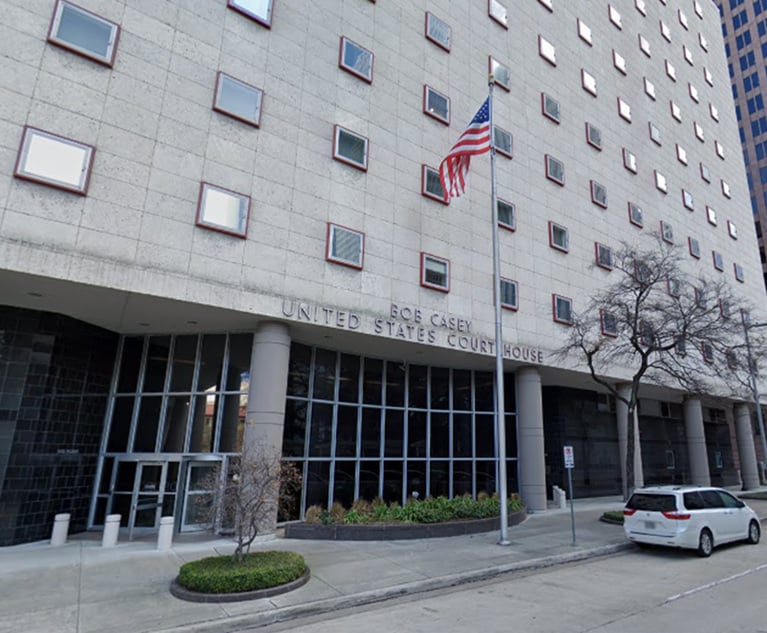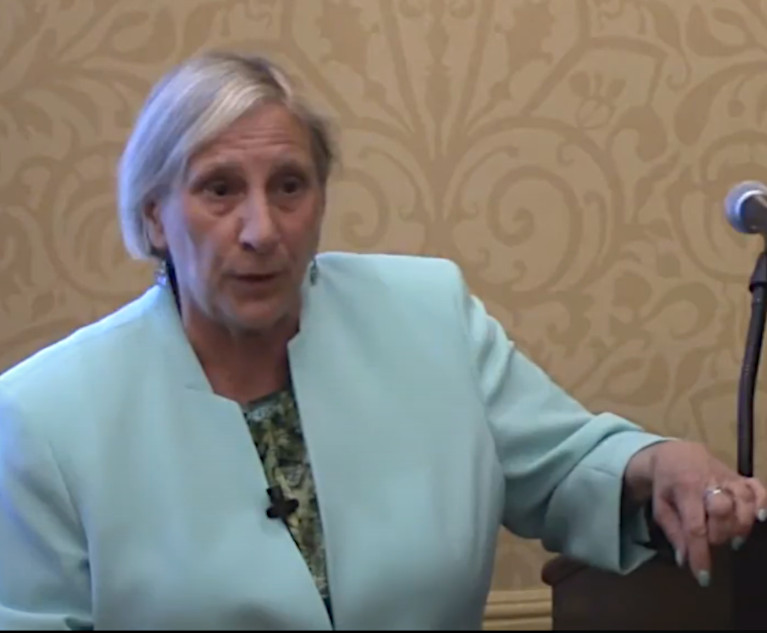'Blue Wave' Hits Texas Judiciary as Democrats Win Seats on Four Appellate Courts
While Democrats failed to elect a single candidate to statewide office in Texas in yesterday's 2018 general election, a blue wave did manage to hit the state hard in crucial down-ballot races, as Democrats won every single seat up for grabs on four of its most influential intermediate appellate courts.
November 07, 2018 at 03:55 PM
6 minute read

While Democrats failed to elect a single candidate to statewide office in Texas in yesterday's 2018 general election, a blue wave did manage to hit the state hard in crucial down-ballot races, as Democrats won every single seat up for grabs on four of its most influential intermediate appellate courts.
In upsets that few political observers—including some of the candidates who won the races—expected, Democrats took five seats each on Houston's all-Republican First Court of Appeals and all-Republican Fourteenth Court of Appeals, eight seats on Dallas' all-Republican Fifth Court of Appeals, four seats on Austin's all-Republican Third Courts of Appeals and four seats on San Antonio's Fourth Court of Appeals.
Perhaps even more astonishing for deep-red Texas, Democrats now hold the majority on all four of those courts, which hear the vast majority of the state's civil and criminal appeals.
“We were not confident at all,” Amanda Reichek, a Dallas employment attorney who beat longtime Republican incumbent Justice Molly Francis, said of her Democratic colleagues' chances of victory on the Fifth Court. “We thought it was going to be a squeaker. We thought it would be by a fraction of a percentage point. We had a massive group of voters, and we had no idea how they were going to vote.”
Yet Reichek and each of her Democratic running mates for the Fifth Court ended up beating their Republican opponents by six percentage points.
“I think that all of us ran because this court had become an echo chamber. It had been Republican dominated since 1992 and represented institutional interests,” Reichek said. “If you represent a human, you were screwed at every turn. And if you represented a company, there was a different set of justice. All of us come from a history of representing individuals, and we wanted to do something about it.''
Part of the reason for the upset was, in modern history, Texas has not seen a gubernatorial election cycle in which more than 50 percent of voters cast their ballots. Elections in which the president is not on the ballot have tended to be favorable for Republican candidates in Texas, because Democrats usually are not as energized.
But a marque U.S. Senate race in which El Paso Congressman Beto O'Rourke came somewhat close to toppling Republican Sen. Ted Cruz brought significantly more people to the polls. That race, combined with straight party ticket voting and President Donald Trump's extreme unpopularity in Texas' biggest cities, likely contributed to Republican losses on urban courts of appeals.
“We had a historic turnout last night in Texas,” said Brett Busby, a Republican justice on Houston's Fourteenth Court who lost his seat to Democratic challenger Jerry Zimmerer. “It went from a 20 percent turnout from last election to 50 percent turnout. A lot of people voted straight party ticket. It was hard to communicate with so many voters. There were so many straight ticket voters that affected the outcome of some of the races.''
The upsets on those four intermediate courts also have another factor in common: All of the courts are based in a solid-blue urban counties with jurisdictions that include once-red suburban counties that are trending purple.
“Not unique to these races is the demographic shift,” said David Coale, a Dallas appellate attorney who followed the races. “The cities aren't going to get more red, and the suburbs are getting more purple. Who knows, if it happened in just one place, it might not be that big of a deal. But if it happened in three different places, you might want to pay attention.''
Coale expects that the change in jurisprudence on the urban intermediate courts will be subtle because of the new justices.
“You're not going to see a lot of revolutionary changes. But in about a year, you're going to see some changes on some issues—willingness to overturn jury verdicts, summary judgment rulings and compelling arbitration,” Coale said. “The Dallas court has a reputation of always accepting arbitration clauses, and that's going to get a hard look.”
The importance of those four urban appellate court can't be overstated, said Kurt Kuhn, an Austin appellate attorney.
“It's where most of the law is made in Texas because most decisions can't go to the Texas Supreme Court,” Kuhn said. “The Supreme Court hears less than 100 cases a year now. Most individual cases are decided in the courts of appeals on the legal issues. And that's the one level of court where you have a right to a second look.”
Peter Kelly, a Houston appellate attorney who beat Republican Jennifer Caughey to win a seat on Houston's First Court, was coy about whether rulings will change on the court—which has not seen a Democrat since Jim Sharp won a fluke election in 2008 and served a single six-year term.
“We're not allowed to say that,” Kelly said. “I would say that most of the Democratic candidates share a healthy respect for jury verdicts and letting questions going to the jury. That's a constitution principle that's embodied in the Seventh Amendment to the Constitution.''
Robert Burns, a Dallas criminal court judge who beat Republican Justice Douglas Lang to become the chief justice of the Fifth Court, expects he and his Democratic colleagues' transition to an appellate court that has been dominated by the GOP for 26 years will be smooth.
“I think right now we and they are shell shocked. We're going to see how it works out. And I've been friends with some of the people on the court for a long time. They're great people,'' Burns said. “I'm sure we're going to get along just fine. I'm not worried about collegiality at all.”
This content has been archived. It is available through our partners, LexisNexis® and Bloomberg Law.
To view this content, please continue to their sites.
Not a Lexis Subscriber?
Subscribe Now
Not a Bloomberg Law Subscriber?
Subscribe Now
NOT FOR REPRINT
© 2025 ALM Global, LLC, All Rights Reserved. Request academic re-use from www.copyright.com. All other uses, submit a request to [email protected]. For more information visit Asset & Logo Licensing.
You Might Like
View All
JCPenney Seeks Return of More Than $1.1M From Jackson Walker For Bankruptcy Work
3 minute read
HUD Charges Texas HOA With Housing Discrimination in Last Days of Biden Administration
5 minute read
How We Won It: Latham Secures Back-to-Back ITC Patent Wins for California Companies
6 minute read
Federal Judge Approves Harvard's Dismissal of Chip-Patent Suit Against Samsung
2 minute readTrending Stories
- 1Decision of the Day: Court Holds Accident with Post Driver Was 'Bizarre Occurrence,' Dismisses Action Brought Under Labor Law §240
- 2Judge Recommends Disbarment for Attorney Who Plotted to Hack Judge's Email, Phone
- 3Two Wilkinson Stekloff Associates Among Victims of DC Plane Crash
- 4Two More Victims Alleged in New Sean Combs Sex Trafficking Indictment
- 5Jackson Lewis Leaders Discuss Firm's Innovation Efforts, From Prompt-a-Thons to Gen AI Pilots
Who Got The Work
J. Brugh Lower of Gibbons has entered an appearance for industrial equipment supplier Devco Corporation in a pending trademark infringement lawsuit. The suit, accusing the defendant of selling knock-off Graco products, was filed Dec. 18 in New Jersey District Court by Rivkin Radler on behalf of Graco Inc. and Graco Minnesota. The case, assigned to U.S. District Judge Zahid N. Quraishi, is 3:24-cv-11294, Graco Inc. et al v. Devco Corporation.
Who Got The Work
Rebecca Maller-Stein and Kent A. Yalowitz of Arnold & Porter Kaye Scholer have entered their appearances for Hanaco Venture Capital and its executives, Lior Prosor and David Frankel, in a pending securities lawsuit. The action, filed on Dec. 24 in New York Southern District Court by Zell, Aron & Co. on behalf of Goldeneye Advisors, accuses the defendants of negligently and fraudulently managing the plaintiff's $1 million investment. The case, assigned to U.S. District Judge Vernon S. Broderick, is 1:24-cv-09918, Goldeneye Advisors, LLC v. Hanaco Venture Capital, Ltd. et al.
Who Got The Work
Attorneys from A&O Shearman has stepped in as defense counsel for Toronto-Dominion Bank and other defendants in a pending securities class action. The suit, filed Dec. 11 in New York Southern District Court by Bleichmar Fonti & Auld, accuses the defendants of concealing the bank's 'pervasive' deficiencies in regards to its compliance with the Bank Secrecy Act and the quality of its anti-money laundering controls. The case, assigned to U.S. District Judge Arun Subramanian, is 1:24-cv-09445, Gonzalez v. The Toronto-Dominion Bank et al.
Who Got The Work
Crown Castle International, a Pennsylvania company providing shared communications infrastructure, has turned to Luke D. Wolf of Gordon Rees Scully Mansukhani to fend off a pending breach-of-contract lawsuit. The court action, filed Nov. 25 in Michigan Eastern District Court by Hooper Hathaway PC on behalf of The Town Residences LLC, accuses Crown Castle of failing to transfer approximately $30,000 in utility payments from T-Mobile in breach of a roof-top lease and assignment agreement. The case, assigned to U.S. District Judge Susan K. Declercq, is 2:24-cv-13131, The Town Residences LLC v. T-Mobile US, Inc. et al.
Who Got The Work
Wilfred P. Coronato and Daniel M. Schwartz of McCarter & English have stepped in as defense counsel to Electrolux Home Products Inc. in a pending product liability lawsuit. The court action, filed Nov. 26 in New York Eastern District Court by Poulos Lopiccolo PC and Nagel Rice LLP on behalf of David Stern, alleges that the defendant's refrigerators’ drawers and shelving repeatedly break and fall apart within months after purchase. The case, assigned to U.S. District Judge Joan M. Azrack, is 2:24-cv-08204, Stern v. Electrolux Home Products, Inc.
Featured Firms
Law Offices of Gary Martin Hays & Associates, P.C.
(470) 294-1674
Law Offices of Mark E. Salomone
(857) 444-6468
Smith & Hassler
(713) 739-1250






